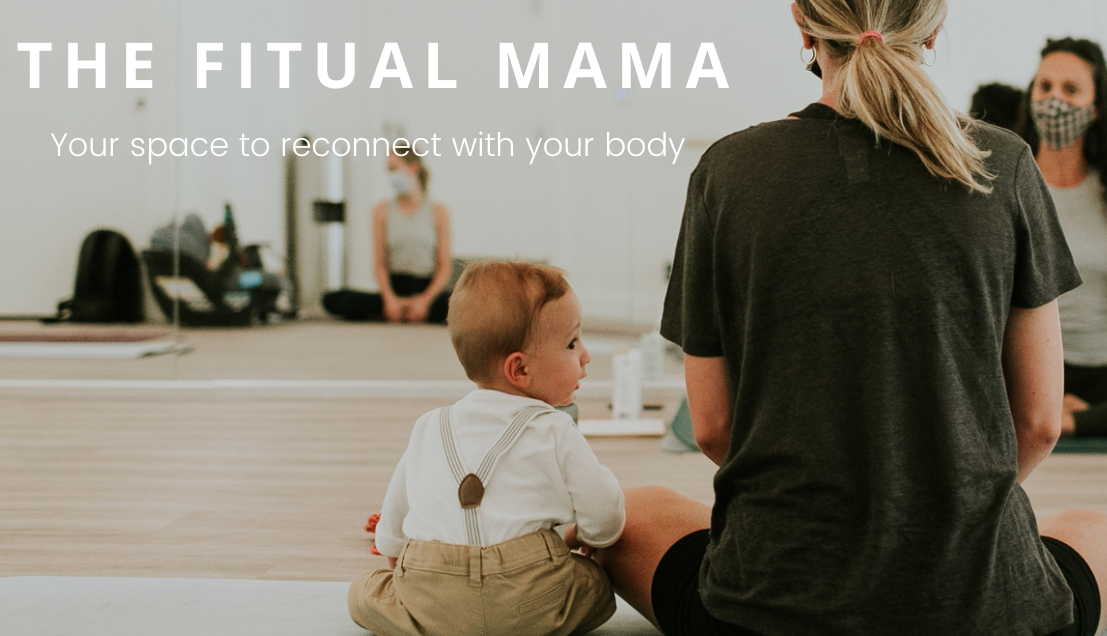
Inside our studio, we empower expecting and postnatal mamas with safe and sweaty workouts to keep you fit during pregnancy and help heal and re-strengthen postpartum. We are sensitive to what women need and we are able to provide a unique path to returning back to your fitness post baby.
WHY IS THE PELVIC FLOOR SO IMPORTANT?
A woman’s pelvic floor is made up of muscles and ligaments in our pelvis. They hold up our uterus, bladder and rectum. Our pelvic floor acts as a hammock for all of these organs and should essentially move like a trampoline when exposed to different stresses. Depending on how we treat our bodies, our pelvic floors can become hyperactive (too tight) or underactive (too weak). Just like any other muscle in the body, if something is too tight or too weak it can cause a variety of issues.
DIASTASIS RECTI
Diastasis Recti is the seperation of your abdominal muscles (rectus abdominus) by the stretching of the connective tissue (linea alba). This abdominal separation happens to 100% of pregnant women and isn’t necessarily something to fear. Although every pregnant women will develop a diastasis, many will resolve as the uterus and body begin to shrink back down. For some women, the gap may stay long after giving birth and may cause core weakness issues. These women often need to adapt their exercise routine to properly accommodate their diastasis and work towards strengthening the integrity of this connective tissue.
URINARY INCONTINENCE
Urinary incontinence is defined as any uncontrolled leakage of urine. There are two types of urinary incontinence that women may notice in pregnancy/postpartum. Urge incontinence is the feeling that you need to empty your bladder RIGHT NOW. This can happen when your bladder is contracting when it shouldn’t be. This can have a large impact on quality of life as some women refuse to go somewhere new unless they know exactly where access to a bathroom will be at all times. Stress incontinence is caused by any type of physical “stress” on your body. This stressor could be anything from sneezing or coughing to different activities like running and jumping. Many women getting back into exercise may notice some leakage and assume this is their new “normal”. Remember, even though it may be common to experience leakage postpartum, it is not normal.
PELVIC ORGAN PROLAPSE
Pelvic organ prolapse or POP happens when the muscles or tissues supporting your pelvic organs aren’t functioning properly. You can begin to feel a bulging sensation or “heavy” feeling into your pelvic floor, vagina or perineum. You may also physically feel or see bulging out of your vagina. This would be one of your internal organs (uterus, bladder or rectum) protruding out. Often adjustments to techniques and breathing need to be made during exercise and movement.
EXCERISE IN PREGNANCY
Exercising in pregnancy is very much encouraged (whether you exercised before or not!), but there are some things that we can do to set ourselves up for success as we transition into our postpartum journey. Being mindful of how we not only exercise but move our bodies during such a delicate time is extremely beneficial. Whether you are going into your birth with plans of birthing vaginally or maybe a scheduled c-section, the stronger your body is before, the better your outcome will be after birth.
EXERCISE IN POSTPARTUM
Return to exercise postpartum can be an extremely intimidating topic for women. Far too often we are cleared for activity after six weeks with little more than a “get back to doing whatever you were doing before”. You are now learning to move with a new postpartum body and therefore need to get back into exercise slowly and carefully. Jumping back into your favourite HIIT workout may sound like a great idea in the beginning, but dealing with stress incontinence or POP a few months down the road is not worth the rush. We want to use these integral first few weeks/months to rebuild your core strength and stability.
WHY IS PRE- & POST-NATAL FITNESS DIFFERENT?
All classes will be instructed by pre and postnatal fitness specialists. What does this mean? Each trainer has taken the time learn the specifics of how to safely and effectively train the prenatal and newly postpartum body. Our focus is to educate and empower women through movement, proper alignment and breath. It’s one of the most important things you can do for your health.
It’s never too late, whether you’re 6 weeks or 6 years postpartum. We are honoured to be a part of your journey!
RETURN TO FITNESS
In this private session, you’ll learn about some of the changes that have occurred over the last 9 months and why it’s important to ease back into your new and powerful postpartum body.
RITUAL + 1
This class is designed for new moms who are at least 8 weeks postpartum and cleared from their doctor to start exercising again.
STRENGTH +1
This class is designed for new moms to rebuild and redefine your strength at your own pace in a safe and effective post-natal strength class.
MEGA MAMA
This class is designed to target your core and pelvic floor and to teach you how to safely modify in our regular MEGA classes. All movements are safe for pre and postnatal women.
Meet our MAMA FITUAL trainers:

Chalnessa Eames
Pre & Postnatal Specialist
Our founder, Chalnessa has been diving into pre and postnatal fitness specifically women’s pelvic health since 2016. Her vision is to create a space for women to move smartly through their pregnancies and beyond. Education is our strongest resource and we are passionate about share it all with you.
Megan Ruud
Pre & Postnatal Specialist
In 2015, Megan graduated from the University of Manitoba with a Bachelor of Kinesiology degree, majoring in Athletic Therapy.
She specializes in prenatal and postpartum. She works along with her clients to work through the many issues that may arise during such a dynamic time in their lives. Working with prenatal clients gives her the opportunity to help women prepare and strengthen their bodies for the changes that they are about to experience. This is done by using exercises to address specific issues such as incontinence, pelvic organ prolapse, diastasis rectus abdominis and any other postpartum issues the may arise.


Sari Hochman
Fitual +1
Sari graduated with a Bachelors in Kinesiology and is registered with the College of Occupational Therapist of Manitoba and a member of the Manitoba Society of Occupational Therapists. She is a Certified Sleep Consultant with the Family Sleep Institute. Along with her specialty in Occupational Therapy she is a yoga instructor and a trainer for MEGA and Flow +1 here at The Fitual.
Jamie Wheaton
The Fitual Advisor
Since graduating with her Physiotherapy degree in 2008 from the University of Manitoba, Jamie has worked in private practice treating a variety of orthopaedic and pelvic health concerns.
She has a special interest in (and really a passion for) women and men's pelvic health. Since 2011, She has travelled across Canada and the United States completing postgraduate training relating to urinary and bowel incontinence, sexual health and pelvic pain, pelvic organ prolapse, menopause, prostate pain among other dysfunctions for both men and women. She especially loves to treat prenatal women for pelvic girdle pain, labour and delivery preparation as well as postpartum recovery including abdominal separation and pelvic floor reconditioning.


Andie Welsh
Pre and Postnatal specialist/ Registered Nurse BN
